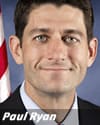The appearance of Congressman Paul Ryan as vice presidential candidate on this year’s Republican ticket has been lauded by many pundits as a potential source of depth for Mitt Romney’s arguably thin-on-details policy offerings thus far. But it remains to be seen what exactly the Wisconsin Representative’s fiscally conservative agenda brings to the former Massachusetts Governor’s table and how loud his voice will be. So, in the lead-up to November elections, what – if anything – can the buy-side glean from Ryan on the shape of a Republican administration’s financial regulation?
On the face of it, the Brookes Brothers-wearing 42-year-old is a close match to his ex-private equity CEO running-mate, who was officially chosen as the Republican candidate Tuesday at the party's convention in Tampa. Ryan is a professed stock-picker whose portfolio includes all-American blue chips like Amazon, Bank of New York Mellon, Exxon Mobil and Apple.
Regulatory filings may also reveal a pro-banking politician, with some of his biggest donors including employees of UBS, Goldman Sachs, Wells Fargo, and Bank of America. In fact, in 2012, he raised almost US$180,000 from securities industry professionals for his Congressional race. But just how pro-banking does this really make him?
While it’s well known both Romney and Ryan insist they would repeal the Dodd-Frank Act, many beltway insiders believe it’s highly unlikely such a move would ever be possible. And beyond this basic platitude, Romney and Ryan differ sharply in a few key areas.
The current GOP House Budget Committee chairman may have voted in 1999 to repeal the Glass-Steagall Act, but recently Ryan has reportedly come out in support of the fundamentals behind the 1933 act which had banned commercial banks from owning, underwriting, or dealing in corporate stock and corporate bonds.
Similarly so, Ryan’s ideas of dealing with prop trading banks have much in common with the Republican-opposed Volcker Rule ban on proprietary trading by deposit-taking institutions.
“If you’re a bank and you want to operate like some non-bank hedge fund, then don’t be a bank. Don’t let banks use their customers’ money to do anything other than traditional banking,” he said at an event in Wisconsin in May.
Romney has yet to mention Volcker publically.
Yet even though he and his running mate are campaigning on an anti-bureaucracy platform, Ryan himself has played his part in propping up the economy with public funds. In 2008 he supported both the auto bailout and the Wall Street bailout. While Romney also originally supported the Emergency Economic Stabilisation Act 2008 that created the TARP bailout programme, he famously did not support any bailout for Detroit.
Path to notoriety
One of the cornerstones of Ryan’s recent rise in popularity and the reason for Romney christening him the GOP’s “intellectual leader” was his 2013 budget proposal, released in March and dubbed ‘The Path to Prosperity – A Blueprint for American Renewal’. In his introduction to the plan, Ryan rails against cronyism and corporate welfare in a free enterprise system he believes is stifled by regulation. Yet promising to curb bailouts, regulation creep and the size of bureaucracy, this 99-page document is extremely light on the details when it comes to financial reform.
And the budget proposal has come under fire from some eyebrow-raising directions, such as former director of the Office of Management and Budget for the Reagan administration David Stockman, who in a New York Times op-ed recently labelled Ryan’s math a “fairy-tale”.
“In short, Mr Ryan’s plan is devoid of credible math or hard policy choices. And it couldn’t pass even if Republicans were to take the presidency and both houses of Congress,” wrote Stockman.
Michael Tanner, senior fellow at Washington-based Libertarian think tank, the Cato Institute, describes Ryan’s budget as “conservative but hardly radical”, noting that other Republican senators – particularly Jim DeMint (South Carolina) and Pat Toomey (Pennsylvania) have recently offered budget proposals that cut government spending significantly more that Ryan.
 “All of this means that Ryan is not really the
government-slashing saviour envisioned by some conservatives. It also means
that he is not the ideological hard-liner portrayed by some liberals,” wrote Tanner
after reviewing the Ryan Budget. “He is, in fact, likely to disappoint his
conservative backers on occasion. But he may also be able to work across party
lines to really change the disastrous course we are now on.”
“All of this means that Ryan is not really the
government-slashing saviour envisioned by some conservatives. It also means
that he is not the ideological hard-liner portrayed by some liberals,” wrote Tanner
after reviewing the Ryan Budget. “He is, in fact, likely to disappoint his
conservative backers on occasion. But he may also be able to work across party
lines to really change the disastrous course we are now on.”
But Tanner sees the fiscally conservative Ryan as more pragmatic than the mainstream media would have you believe and says he has been proven to relax his policies if it garners Democratic support.
“Throughout his time in Washington, Ryan has been the classic ‘half a loaf’ type of conservative. Time and again, he has shown that he is willing to compromise and take far less than he had originally sought, as long as he is moving incrementally in the direction he wants to go,” observed Tanner in the National Review. “You won’t find Ryan on the short end of any 434-to-1 votes.”
Yet no matter Ryan’s policies or voting record, at the heart of the matter is Ryan’s potential ability to influence a Romney administration – and many believe such influence would be limited.
Sean Owens, director of fixed income and derivatives at financial consultancy Woodbine Associates, cannot see Ryan being any more influential than any other recent Vice President.
“Ryan on the ticket adds to the appeal of Romney but the question is where would a Republican administration want to spend their political capital? Healthcare, the economy or financial regulation?” Owens questions. “I’m not sure Ryan’s views on financial regulation would bleed through to a Romney White House.”
To Owens, this has as much to do with the lifecycle of presently-proposed regulations as it does the relationship between POTUS and his veep.
 “Title VII of Dodd-Frank [Wall Street Transparency and
Accountability] is a done deal. Volcker is one place where they could exert
influence if they wanted to but regulators are trying to lock it in before the
election,” says Owens. “It is questionable whether they would try to repeal
Volcker when in administration because the public backlash could be
significant.”
“Title VII of Dodd-Frank [Wall Street Transparency and
Accountability] is a done deal. Volcker is one place where they could exert
influence if they wanted to but regulators are trying to lock it in before the
election,” says Owens. “It is questionable whether they would try to repeal
Volcker when in administration because the public backlash could be
significant.”
(G)Rand ideas
Over the years, Ryan has proffered two American intellectuals as influences in his thinking and ideology. The first is Nobel Prize winner and onetime adviser to Ronald Regan Milton Friedman, a well-known University of Chicago professor who was a prominent proponent of the free market system with minimum intervention. But far further to the right is another of Ryan’s influences; Ayn Rand, the mother of Objectivism, an extreme view of laissez-faire capitalism which sees self-centredness as virtuous and altruism as immoral. For Rand, society’s welfare should be subservient to self-interest.
“If I had to credit one thinker, one person, it would be Ayn Rand,” Ryan said of the Russian-born American author of ‘Atlas Shrugged’, referring to her as his inspiration for entering public life.
Certainly it is not very Republican to believe – as Rand did – that abortion is a moral right or that God does not exist. And recently Ryan has made efforts to downplay his fascination for the philosopher. But to industry folk, policy wonks and industry pundits alike, it is curious to consider how Rand’s ideas could have influenced Ryan’s opinions on market regulation.
